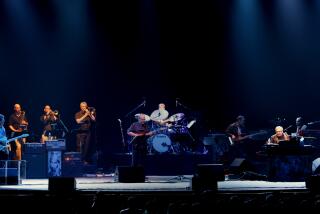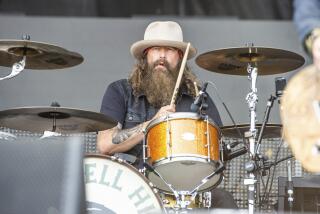Joe B. Mauldin, bass player for Buddy Holly and Crickets, dies at 74
When a 16-year-old high school student named Joe B. Mauldin told his mother that he was planning to join a rock ‘n’ roll band, she suddenly saw his future dive out the window and shatter on the streets of Lubbock, Texas.
“She told Joe B. that she hoped he would have to ‘work his fingers to the bone’ for the remainder of his days and that he would regret his decision for as long as he lived,” author Ellis Amburn wrote in a 2012 biography of rock legend Buddy Holly.
Mauldin — known as Joe B. to his family, friends and fans — played stand-up bass in a group that came to be called the Crickets, a little band that backed up Holly and in less than two years would thump out such classics as “That’ll Be the Day,” “Peggy Sue,” and “Well… All Right,” which Mauldin co-wrote.
Mauldin, who became a recording engineer in Los Angeles after the Crickets’ 1958 breakup but continued to perform occasionally with the group’s alumni, died Saturday in Nashville, his home of more than 30 years. He was 74.
Mauldin had cancer, according to the Associated Press.
At 14, he started playing the stand-up bass and joined a band called the Four Teens. While ditching study hall to smoke cigarettes, he got to know fellow student Jerry “J.I.” Allison, a drummer who invited him along to play at a dance at the Elks Lodge in Carlsbad, N.M.
The boys’ yet-unnamed group was to back up Holly, a slightly older guy — he was almost 21 — who sang, played lead guitar and wore distinctive, black horn-rimmed glasses.
“It was the defining moment not only of their lives, which would be inextricably intertwined from now on, but, to an extent, in the history of rock ‘n’ roll, for this was the prototypal band that helped invent the sound of rock,” Amburn wrote.
Decades after the Elks dance on March 2, 1957, celebrated British rocker Keith Richards called the Crickets “probably the first global, international rock band of all time.”
“There would probably be no Beatles or Rolling Stones without them,” Richards, one of the original Stones, said.
Mauldin, Allison, Niki Sullivan and Sonny Curtis were inducted into the Rock and Roll Hall of Fame in 2012. Holly was among the institution’s first inductees, in 1986.
Born in Lubbock on July 8, 1940, Joseph Benson Mauldin Jr. kept his part-time job as a butcher’s assistant for several months while the Crickets took shape. Less than a year after their Elks gig, they were performing on “The Ed Sullivan Show.”
The swift success of their upbeat, Texas rockabilly sound was stunning. From August 1957 to August 1958, seven of their songs hit the Top 40. “That’ll Be the Day” topped the charts in September 1958 — but the stresses of touring and sudden fame took a toll.
Before a London concert in March 1958, Holly and the ordinarily quiet Mauldin got involved in a dressing-room fistfight triggered by Joe B. lighting up a cigar. In October, Buddy Holly and the Crickets parted.
On Feb. 3, 1959, Holly died in the crash of a private plane near Clear Lake, Iowa. Also killed were the top rock musicians Ritchie Valens and J.P. Richardson, who was better known as the Big Bopper.
“The night that Buddy was killed, J.I. and I had been trying to call him,” Mauldin later told the Lubbock Avalanche-Journal. “Our agreement was that if anyone ever wants to get back together, all it takes is a phone call.”
Mauldin served in the Army from 1964 to 1966.
As an engineer at Gold Star Studios in Los Angeles, he worked with Phil Spector, Herb Alpert, Leon Russell and other major figures in music.
His survivors include Jane, his wife of 51 years, and his daughters Jennifer Mauldin and Melody Stephenson.
Twitter: @schawkins
More to Read
Start your day right
Sign up for Essential California for the L.A. Times biggest news, features and recommendations in your inbox six days a week.
You may occasionally receive promotional content from the Los Angeles Times.







